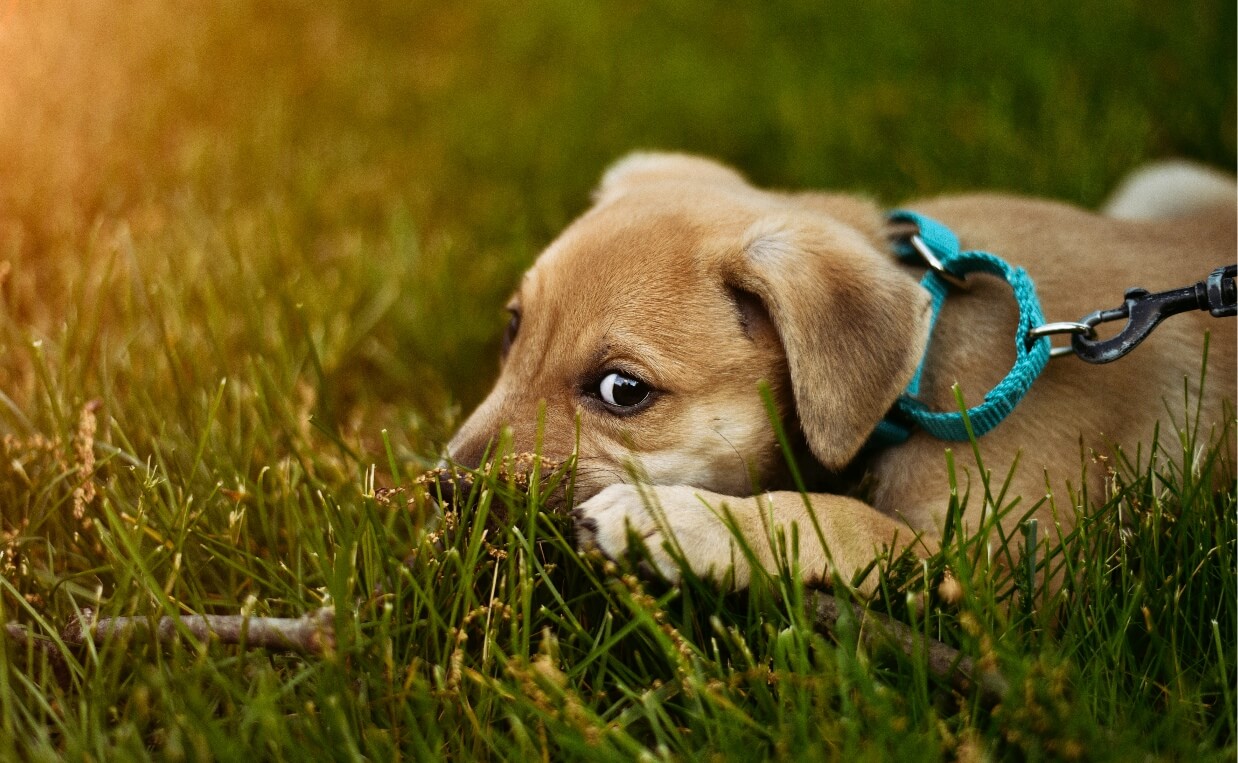
As more and more people are choosing to adopt a dog from a shelter or rescue organization, more people are finding themselves sharing their lives with a scared dog. While it’s great shelter dogs are getting a chance, many people in this position are wholly unprepared for getting a scared dog to trust them.
Unfortunately for new guardians, love is not all these dogs need. Most scared dogs, in fact, will actually relax more quickly if they’re given space. Dogs are not humans, and they often do not find comfort in hugs, nose-to-nose kisses, and baby talk.
Why Is My Dog So Scared?
There can be a variety of reasons why your dog might be scared, and they don’t all have to do with you personally.
Here are three of the most common reasons why your dog is afraid.
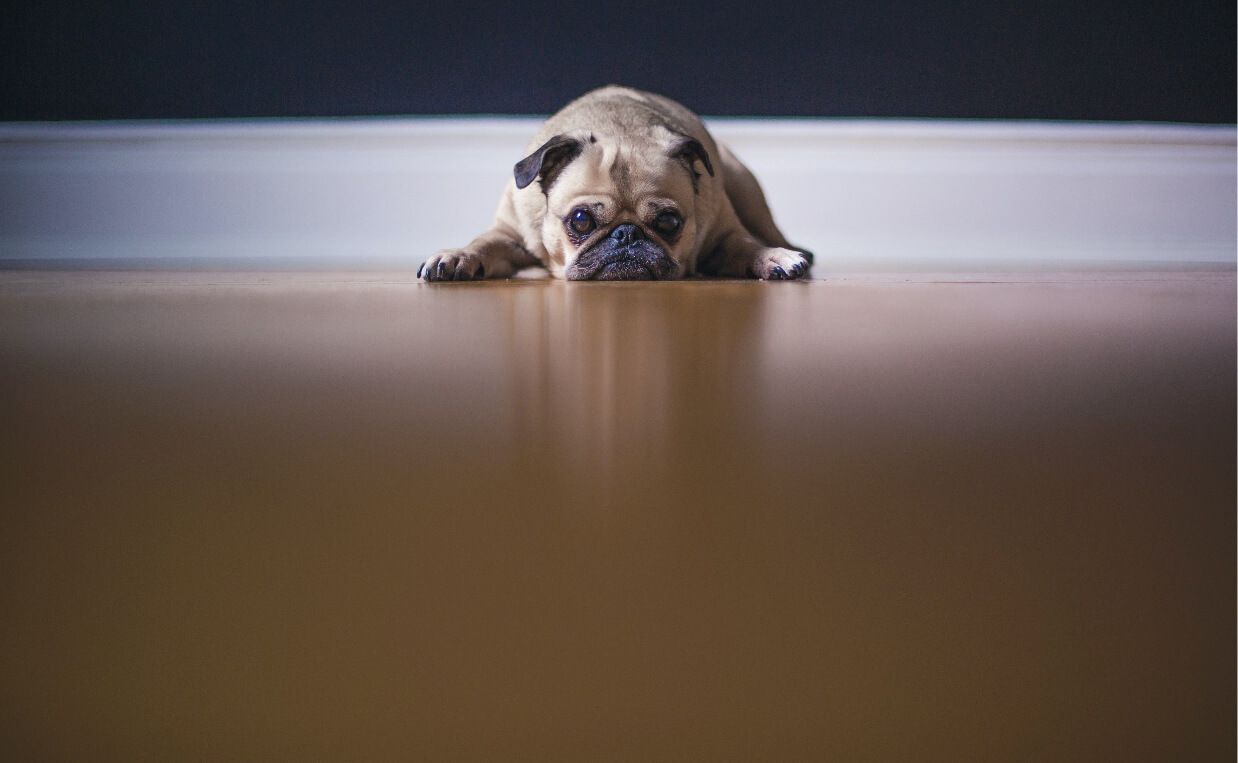
Your Dog Had a Bad Previous Owner
Some fearful dogs are afraid due to a neglectful or abusive experience with a previous owner. For those poor animals, their daily environment was chaotic, violent, filled with anxiety and competition with other animals for dominance.
Your Dog Had a Bad Experience with Someone
Sometimes dogs become fearful when they have a scary, negative or painful experience, even if the experience wasn’t intentional. It is usually something traumatic like getting hurt, yelled at, or punished.
This is why positive reinforcement training is a better option than using punishment to try to train your dog.
Dogs can also be scared of people if the person is overly anxious, stress, or fearful.
Your Dog Was Adopted from a Shelter
Dogs can be fearful if they were in a scary place, like a shelter or a home with other aggressive dogs before they came to live with you.
While some dogs are able to acclimate to their new home quickly, others need more time to get adjusted to their brand-new life. When you think about how challenging it is to go from one place to a new place so quickly, and with people you don’t really know yet, it is easy to understand why your dog is fearful.

So how do you get a scared dog to trust you?
-
Recognize your dog is afraid
The first step is, of course, to recognize your dog is fearful in the first place.
If you already know your dog is scared, well done for recognizing the signs.
If you aren’t sure, you aren’t alone. Many people find it hard to tell when their dog is afraid and may even think their dog is okay when it’s not the case. This is very common but it can mean you’re at risk of being bitten without realizing the risk.
If you want to know when or if your dog is afraid, you have to learn to read dog body language. Some of the most common signs include the following.
Your dog:
- Hides from you
- Tucks his or her tail between their legs
- Lowers his or her head
- Avoids eye contact
- Trembles when you’re around
- Becomes aggressive
-
Ensure your puppy is socialized
If your scared dog is a young puppy, you still have time to prevent his or her fearful behavior as an adult by taking advantage of the developmental socialization periods every puppy goes through.
The best way to deal with fear is to ensure your puppy has positive, happy experiences with humans during the critical socialization period of around 7 to 15 weeks of age. During this time period, puppies are rapidly learning about the world around them. This is also the age when fear develops. If your puppy has happy, positive experiences with various people during this time period, it will likely lead to future harmonious relationships with humans. If your puppy has scary, negative experiences with humans during this time, irrational fears will likely develop.
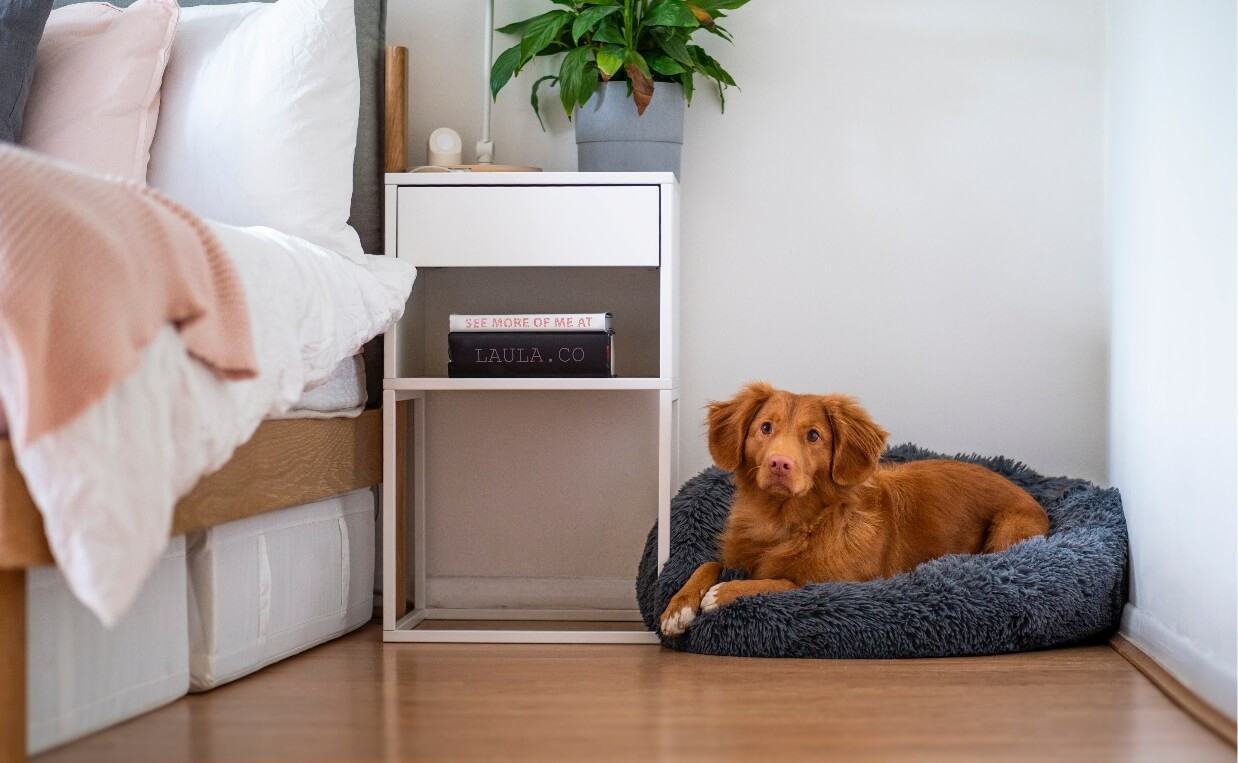
-
Give your dog plenty of space
In order to feel safe, your dog needs a private place to retreat to when things get too overwhelming. This could be a bed or a crate. Whatever it is, leave your dog alone when they retreat to their refuge – they likely just need some space.
While you don’t want your new rescue dog to feel like they have to hide from you, you should give them a space they feel they can retreat to when they need to take a break. This can actually make them feel more confident because they know they have somewhere to go if they need to.
Some dogs respond well to a calming donut bed to help them feel safe. It’s ideal for dogs who like to curl up. The raised rim creates a sense of security and provides head and neck support, while the super soft filling offers joint and muscle pain relief.
-
Gradually build up closeness
If your dog has a fear of humans, he or she might not be comfortable getting to close to you physically. You need to respect your dog’s boundaries. Pushing your dog out of his or her comfort zone too soon can actually set them back, not to mention you might get nipped.
Avoid hovering over your dog, don’t touch your dog in sensitive areas, and don’t try to give your dog hugs. If you want to give your dog a treat or a toy, rather than getting close to them, drop the toy or treat a few feet away and move away.
Over time, you start dropping the toy or treat and stay closer and closer to the item until your dog feels safe enough to pick it up when you are right next to it.
Eventually, you can start lightly touching your dog on the top of they head or back to see how he or she responds.
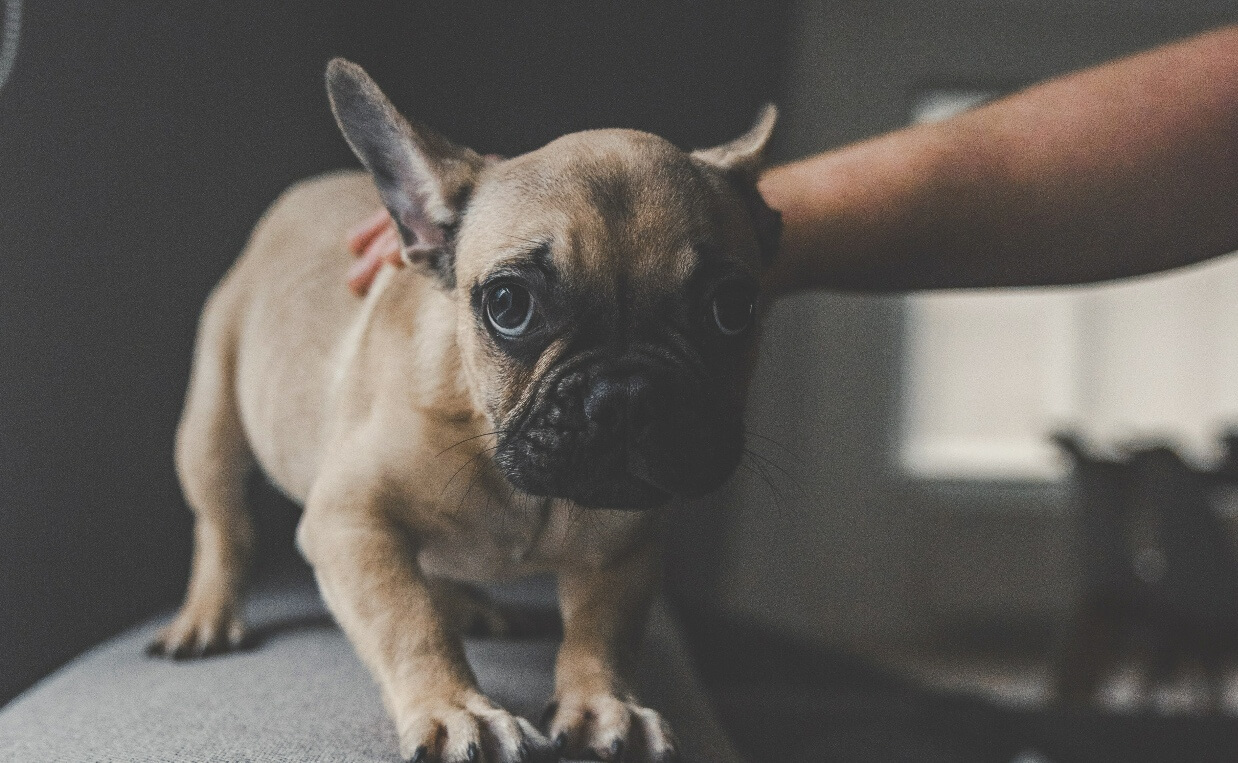
-
Watch how you speak
When you are interacting with your scared rescue dog, stay relaxed and speak in a calm and soothing voice. Try very hard to refrain from raising your voice, even in surprise or pleasure, as this can alarm your dog. To go along with this, touch your dog only in a gentle manner to build trust.
-
Use positive reinforcement
Creating memories while using positive reinforcement will help to shape new, happier experiences for your pup. This includes everything from how you potty train to crate train to how you go on walks together.
-
Follow a routine
Dogs love routines and if you change their routine dramatically they will feel stressed. To help alleviate this, try to keep things the same as much as possible when dealing with a fearful dog.
Try to feed your dog at the same time every day, go for walks at the same time, give your dog consistent structure to reduce stress.
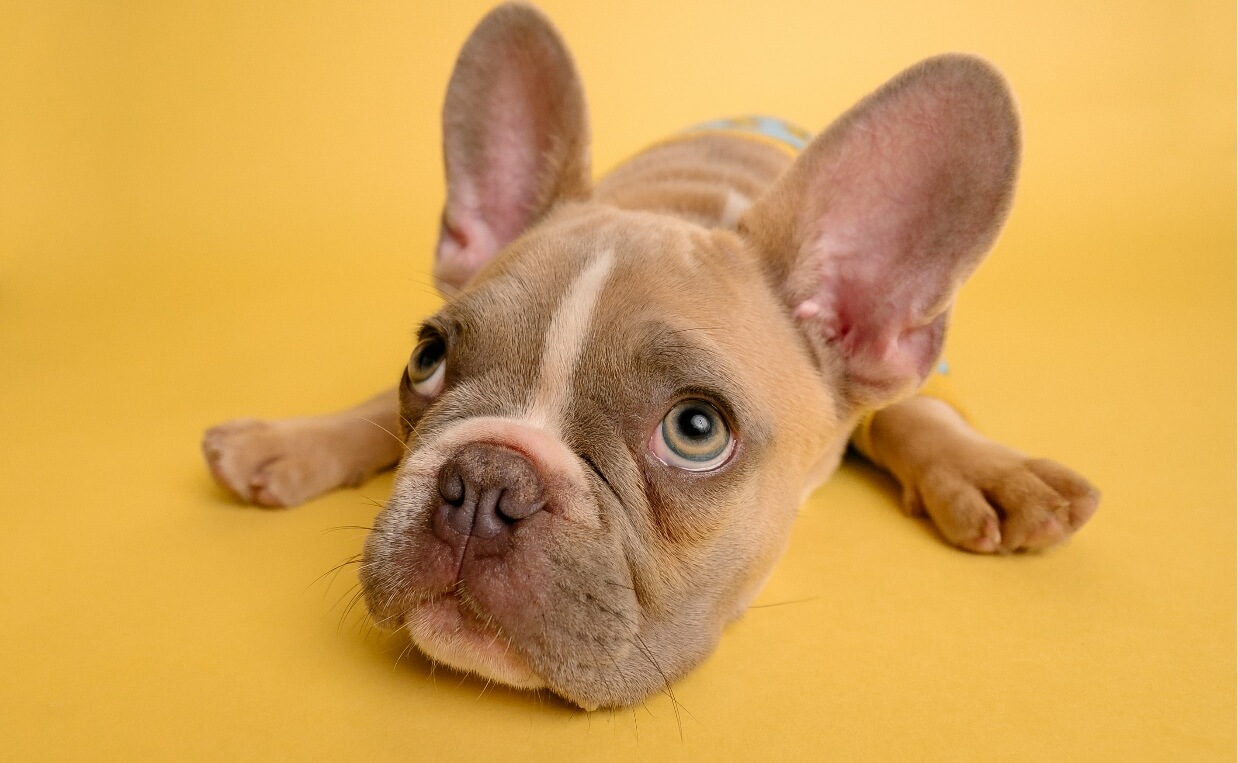
-
Play with your dog
Dogs like to have fun! Play is just as important as training. Playing with your dog builds trust, positive associations and reduces stress. Play will help your dog relax and reduce fear. Just don’t try to play rough with your dog until he or she shows they are ready.
-
Manage your own emotions
Dogs can pick up on human emotion; if you’re harboring fear or anxiety, it may affect your dog. Take time to manage your stress, maintain good self-care and practice calming yourself with breathwork or meditation as needed.
-
Try calming aids
If your dog seems more fearful than you can comfortable handle, consider getting over-the-counter calming supplements and products (like vests or music) to help your dog.
While it will take some time, most rescue dogs will eventually trust you. Each dog is different, so there is no hard or fast rule for how long it might take. Some canine behaviorists suggest dogs will be very fearful for the first three days in your home. Within three weeks, he or she should be feeling more comfortable, but they may still have significant anxiety. Within three months, they should be feeling comfortable in your home.
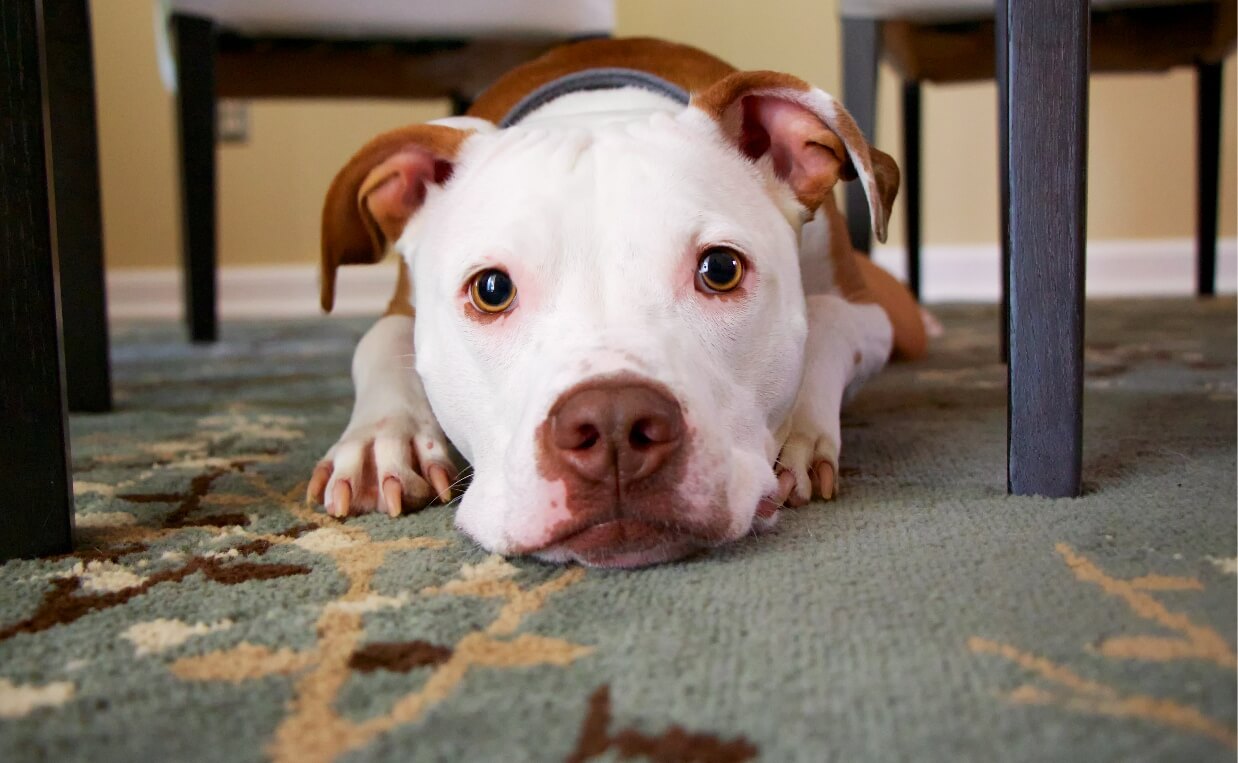
Patience is the most important thing to remember when dealing with a fearful dog. Just like humans, dogs can’t recover from trauma overnight, but if you commit to the process of supporting them, in time you’ll have the loving and loyal canine companion you were hoping for.
Do you have experience dealing with a fearful rescue dog? What is your advice for dealing with them? Share your experience in the comments below…

 What Everyone Should Know About Puppy Mills
What Everyone Should Know About Puppy Mills Should You Feed Your Puppy Adult Dog Food?
Should You Feed Your Puppy Adult Dog Food? What To Expect When Adopting a Dog With Behavior Problems
What To Expect When Adopting a Dog With Behavior Problems Why You Should Consider Donating to Animal Charities
Why You Should Consider Donating to Animal Charities Does Your Dog Have Back to School Separation Anxiety?
Does Your Dog Have Back to School Separation Anxiety?






My daughter was going to watch my two little Chi mixes for a while till I found a new apartment . Where I was going to be staying temporarily would only let me keep one with me I had 3. Boo was my youngest at 1 and 1/2 years old . I took him over to her house first. He was my little buddy he went every where with me even to work. When I first took him there he was in my son in laws lap all the time they loved each other. At that time I told them they could keep him brings they were hitting off so well. When I took Ebony (Boos mother ) over there she has been timid and fearful since she was able to run around . She went into their living room and only came out to eat and go out . Boo stayed with her and did the same. Neither of the 2 dogs would let anyone you h them . I thought Boo would go back to my son in law when I took E ony with me. My daughter would not let me come over and see my dogs once I took Ebony over there. I told them they could keep Boo because he was getting along so well at first and they had a doggy door to the fenced back yard so I thought it would be a better home for him than being in an apartment. They were there 2 months when I picked Ebony up
My daughter had not let me see them at all in that 2 months. Ebony was so excited to see me she couldn’t quit squirming all over in my arms . My daughter rushed me out the front door not letting me take time to pick Boo up and give some love. Ra month after I picked up Ebony Boo was still staying in their living room and wouldn’t let anyone you h him so there’s e months of not connecting with any humans. She still hasn’t let me come see him . I was getting sick with worry about him I begged her to let me come see him he probably felt like I abandon him . She wouldn’t let me she said it would set him back. 5 months went by since I had taken him over there. She still couldn’t pet him or pick him up. I told her to just let him come back with me. She refused . I feel she TRAMATIZED him by making him go through that for so long There was no reason for him to have to live so afraid of every body I didn’t die he could come back with me but she wouldn’t let him. It’s been 7 months now and she has gotten a leash on him so she can take him on a walk. I feel she has put him through unnecessary trama tramatizing him and me . I cried for two months I thought I was having a break down . Would it have been easier for him if if I could have gone and seen him every few days of would it have been the best thing to let him come back to me me. I feel she made him feel abandon by not allowing me to see him. I feel it would have been best for him to come home where he knew he was loved loved by me and that’s why he was acting like that he lost me. I thought I’d get to see him alot and he would be happier with being able to go out when ever he wanted she has 4 other dogs . So would it be better for him to come back to me .? I’m looking at his emotional well being . Could some one please tell me what’s best for my little buddy . I just want him happy living the best life any little dog can live
Thank you for sharing your concerns and experiences with your dogs with us here on the Canine Campus blog. It is so hard when your beloved pet is having a hard time or is grieving the loss of another pet or person they are bonded to. It sounds like you’ll need to work this out with your daughter and her husband and only the three of you can decide what is best for all involved.
Here is a blog post I wrote titled “How to Help a Grieving Dog“. There might be suggestions in it that will be helpful for you in your situation.
It is clear you love your dogs and only want the best for them. I hope you’re able to resolve this with your family and help your dog adjust to whatever changes lay ahead.
I rehomed a 5 yrs old Shi Tzu from a friend’s sister. She used to keep him caged in a crate all day (until whenever) she arrived home, and let him out loose in the yard, feed him, and returned him back inside the crate for the night. It also, appeared someone verbally and physically abused him as well. I’ve had him for a month now. He was doing better with me. Until we had some bad thunderstorms lately. He has gotten worst by acting afraid of me; Hiding, not eating, and Wherever I speak to him, he holds his head down and body down with his tail down; Like I’m going to hurt him. I don’t know what to do!
First of all, thank you for taking on a dog who may have been abused. It can definitely be challenging to care for a dog with a history of trauma. You may want to discuss your dog’s needs with your vet to help make a plan for healing. The plan could involve medication and/or working with a dog behaviorist. Many dogs are very triggered by thunder especially if they have trauma. Here are some suggestions of things you can try: 7 Ways to Calm Your Dog During a Thunderstorm. Another approach is to apply stress management techniques to help your dog such as listed in this post: Signs Your Dog is Stressed and What To Do About It. The most important thing you can do is to have patience and work on understanding your dog’s triggers and how he communicates what he needs. I wish you and your Shih Tzu all the best and a happy life together!
Mid Dec 2022 my brother adopted a Jack Russell from a JRT rescue. Spike’s background is a bit sketchy but from what we have been told his original owner was a lady in poor health who had to have surgery. She had a male caregiver and evidently this man was less than kind to Spike. She turned Spike over to the rescue in Oct or Nov and he remained there until my brother adopted him in Dec. Spike was 8 months old when my brother (Also called Spike) brought him home. The orig owner has since passed away. Spike loves me but is fearful of men including my brother. I moved in shortly after Spike moved in and brought Chloe, my cocker spaniel with me. It has be almost 10 months and Spike is still fearful of my brother. Now I say he is fearful but he raises a ruckus if my brother ignores him. If Chloe gets love and pats from my brother Spiky gets jealous and nips at her. My brother has spent hours throwing the ball for Spiky. My brother will lay down on the living room floor or on the grass outside and Spiky will come to him, lick and nip at his fingers and toes. He will even get close enough to lick my brother’s ear. But he will not let my brother touch HIM. It’s like he wants him too but he just can’t bring himself to allow it.
Trying to get a harness on him is like fighting with a wild cat. And once I get it on him he turns into Houdini. Hook a leash to the harness and he sounds like I’m trying to cut him open with a dull knife. I love him dearly. It breaks my heart that someone treated him in such a way that he is fearful all of the time. I know what that feels like.
I know there is no quick fix but we need guidance. Are we doing him a disservice by keeping him? My brother lost his wife 2 weeks after adopting Spiky. It is heartbreaking because he wants to be able to pet and play with Spiky without being nipped. He wants to be able to take him places. At 72 this may be his last pet.
Any thoughts, suggestions, advice? Any input is appreciated.
Thank you for visiting the Canine Campus blog and sharing your brother’s situation with Spike. You don’t mention where your brother lives, but you may want to consider enrolling Spike in daycare as long as he can pass the admissions test. This would help him learn how to behave around other dogs and learn to trust other people. Another strategy you should encourage your brother to take is to find a dog behaviorist. This article is a good starting point. Do You Need to Hire a Dog Behaviorist? A dog behaviorist can help identify what’s triggering Spike and the steps needed to help Spike recover. The good news is that a qualified behaviorist can help your brother and Spike develop a strong bond through the recovery process. Definitely don’t give up without seeking qualified help! I hope your brother is able to get Spike the help he needs and they enjoy a happy life together!
After 9 months my 10 year old rescue ChiPin has fully integrated into our home/pack.
He started out very timid and he worried quite a bit but he’s (I believe) overcome that to the point that he’s come out of the shell that he created to keep him safe. His training slowly came out, like he’s heel and leash trained. So house trained it’s great and good for the inside but he has waited 10 hours when it’s raining (he will NOT get wet when he does his “thing”.)
Inside he’s become quite the love bug. We have a recliner and when one of us is sitting on it, he’ll crawl out between our legs and go to sleep. He’s very sedate but loving.
He sleeps with my husband during the day and with me at night (I sleep in the recliner for health reasons)
He’s real healthy, and he seems happy. He knows I’m the alpha, my husband is the elder (he 85) and he’s the beloved member of our pack.
ADOPT
Sadly my ChiPin was very old when I got him. He had a collapsed trachea and enlarged heart with a murmur, at the end he was having too much trouble breathing. We decided to have him put to sleep after having him for just a year. (RIP Doug)
We have a new dog, Redd Fox, some sort of Chihuahua mix. He looks like a fox.
When he came to us we were told that he might not let us touch him. I was on the floor when he came through the door, I was calm and he came to me after a few minutes and within the greeting time (maybe 45 minutes) and by 4 o’clock he was watching TV in my lap. He has be come a velcro dog and a lap crazy lap dog 🙂
He is scared and worried still but not with us in our home. He’s a pretty good roommate and does his job (crumb patrol) great and he is also house trained and that is a good thing (though sometimes I can’t tell if his stare is for a potty break/walk or he just wants to get up in a lap or he want food/affection.
It’s outside he’s the most worried. I’ve started to take him to the small dog park every day and he’s getting much braver and more confident. He’s even Run with another dog, but I don’t think he knows he’s a dog yet let alone a pet.
I’ve just started training in a beginner’s class, he gets distracted easily so holding his attention can be a chore but slowly and surly we’re establishing a common language that we can use with respect and trust. He understands when I say ‘yes” and then he gets a treat. He almost brings a fetch toy back but still drops it a few feet away, I can change that because he still trusts me and loves me so he want’s to do good for me.
He was found on the street and was with the rescue for 2 months with no background info,. except maybe he was in a home that ignored him or worse and was then either a run away or an escape refugee on the street for who knows how long.
He’s still in survival mode but he’s cracking his survival shell a bit and letting go of that mode.
I figure he’ll be a great companion in a year (I’ve had him since Feb. 6th 2024) or so. He’s doing great so far.
Thank you for sharing your story. I’m so glad you and Redd Fox found each other! Thank you for caring for him so well. I hope you both have a wonderful future together!